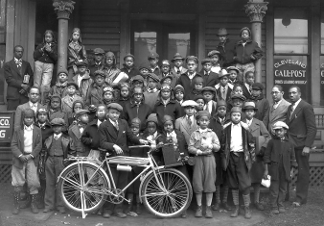BROWN, JERE A. (1841-28 Mar. 1913), a black Republican politician, was born in Pittsburgh, Pa., attended Avery College in Allegheny, Pa., and lived in Canada and St. Louis before arriving in Cleveland in 1870 or 1871, becoming active in politics here to improve his status. He was appointed bailiff for Judge Daniel R. Tilden, and in 1877 deputy sheriff, the first African-American to receive political appointment in Cuyahoga County. He served as clerk for the Board of Equalization & Assessment; and in 1881 became a letter carrier, an elite occupation, resigning after 4 years because it kept him from politics. In 1885 he was elected a state representative and served 2 terms (1886-87, 1888-89).
Brown sponsored legislation preventing life insurance companies from discriminating against blacks (see AFRICAN AMERICANS), helped secure funds for Wilberforce College, and repealed Ohio's BLACK LAWS. He supported organization of the militant civil-rights group, the Afro-American League, in 1890. Later Brown became more interested in partisan politics, working for Republican candidates and expecting rewards. For supporting U.S. Sen. John Sherman, he became a customs inspector (1890), later gaining appointment to the Ohio Dept. of Insurance, becoming the first black to serve there. Brown served in the Dept. of Internal Revenue in Washington, D.C., before returning to Cleveland as immigration inspector. Brown, married to Nina L., had 2 children: Frances and Jere. He was active in the Prince Hall Masons, was a member of the Republican State Executive Committee, and a trustee of Wilberforce College, where he was buried.
Last Modified: 10 Jul 1997 05:11:02 PM- Related Article(s)









